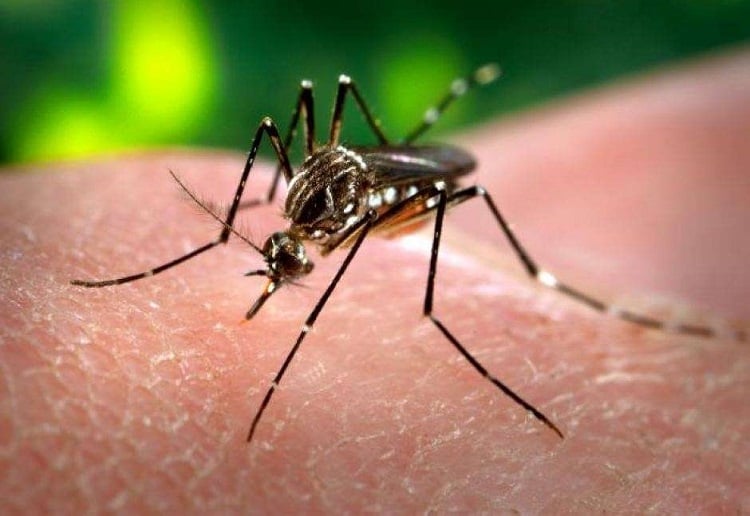Zika virus discovered in Australia travellers returning from South America.
ABC news reports Australian virologists say the mosquito-borne Zika virus, linked to brain damage in thousands of babies in Brazil, has hit Australian shores.
However, for the virus to spread, it would need the right species of mosquito to act as a vector.
So far only one such mosquito is present in Australia — the Aedes aegypti mosquito — which is found only in far north Queensland.
The Department of Foreign Affairs and Trade has issued new advice warning Australians, particularly pregnant women, to reconsider plans to travel to 22 countries affected by the virus, including many in South and Central America, and the Pacific island nation Samoa.
The new travel advice comes in response to a warning by the World Health Organisation that Zika virus is now likely to spread to all countries in South, Central and North America except Canada and Chile.
Brazil’s Health Ministry said in November that Zika was linked to a foetal deformation known as microcephaly, in which infants are born with smaller-than-usual brains.
Brazil has reported 3,893 suspected cases of microcephaly, the WHO said last Friday, more than 30 times more than in any year since 2010 and equivalent to 1 to 2 per cent of all newborns in the state of Pernambuco, one of the worst-hit areas.
Zika has not yet been reported in the continental United States, although a woman who fell ill with the virus in Brazil later gave birth to a brain-damaged baby in Hawaii.
Threat to Australia should be taken seriously: scientist
The virus was first found in a monkey in the Zika forest near Lake Victoria, Uganda, in 1947, and has historically occurred in parts of Africa, South East Asia and the Pacific Islands, but it is normally only a mild disease.
Professor Dominic Dwyer, a virologist from Sydney’s Westmead Hospital, said scientists did not know whether any other mosquitoes in Australia could be potential vectors.
“There have been some people who have come back to Australia who’ve had Zika virus infection,” he said. “The main mosquito carriers of the virus are not present to any great degree in Australia, except perhaps up in the top end of Queensland.”
“But we’re not entirely sure yet whether some of the Australian mosquitoes could carry Zika virus.”
“So I think there’s a bit more work to be done to sort that out.”
However, Professor Dwyer said the risk to Australia should be taken seriously.
“I think it’s a question of being alert but not alarmed,” he said.
“When you get a virus go into a population where the people aren’t immune, then you often get very rapid spread.
“So for example over the last decade there have been a number of islands in the Pacific that have had explosive outbreaks of Zika virus infection, as well as others like Chikungunya virus.
“So when the virus gets in there and you’ve got the right mosquitoes — vectors to carry the virus — then the population aren’t immune, so the transmission in the community can be really rapid.”
What is Zika virus?
Zika virus is spread through mosquito bites
Common symptoms include fever, rashes, joint pain and conjunctivitis
Outbreaks have occurred in Africa, South-East Asia, the Pacific and the Americas
There is no vaccine or medicine to treat the virus
Pregnant women urged to delay travel
Professor Dwyer has backed the decision by the Department of Foreign Affairs and Trade (DFAT) to issue a warning to Australians, especially pregnant women, to reconsider any plans to travel to affected countries.
“The outbreaks can be so rapid and so large, that if you travel into that sort of outbreak scenario, then there is a reasonably high risk you could get infected,” he said.
“So I think if you were pregnant, it would be foolish to go there at this stage, until we know a little bit more about what is going on.”
DFAT’s advice said Samoa was the only country in the region with an ongoing outbreak after previous incidences on Yap, in the Federated States of Micronesia, and French Polynesia.
WHO has also advised pregnant women not to travel to affected areas.
“If the epidemic was still going on in August, when Brazil is due to host the Olympic Games in Rio de Janeiro, then pregnant women should either stay away or be obsessive about covering up against mosquito bites,” WHO director-general Margaret Chan said.
“Although a causal link between Zika infection in pregnancy and microcephaly has not … been established, the circumstantial evidence is suggestive and extremely worrisome.
“An increased occurrence of neurological symptoms, noted in some countries coincident with arrival of the virus, adds to the concern.”
There is so far no cure or treatment for Zika virus, nor any vaccination.
Large drug-makers’ investments in tropical disease vaccines with uncertain commercial prospects have so far been patchy, prompting health experts to call for a new system of incentives following the Ebola experience.
“We need to have some kind of a plan that makes [companies] feel there is a sustainable solution and not just a one-shot deal, over and over again,” US National Institutes of Health director Francis Collins said last week.
The Sao Paulo-based Butantan Institute is currently leading the research charge on Zika and said last week it planned to develop a vaccine “in record time”, although its director warned this was still likely to take three to five years.
How to prevent it:
There is no vaccine to prevent, or medicine to treat Zika virus.
Travellers can protect themselves by taking steps to prevent mosquito bites, such as using a mosquito net and wearing insect repellent.
Pregnant women are being warned to avoid travelling to 22 countries were outbreaks have been reported.
22 countries affected
The US Centers for Disease Control and Prevention issued initial travel warnings to pregnant women last week, adding eight more places to the list on Friday.
The warnings now extend to:
Central and South America: Bolivia, Ecuador, Guyana, Brazil, Colombia, El Salvador, French Guiana, Guatemala, Honduras, Mexico, Panama, Paraguay, Suriname, Venezuela
Caribbean: Barbados, Saint Martin, Haiti, Martinique, Puerto Rico, Guadeloupe
Oceania: Samoa
Africa: Cape Verde
Share your thoughts below.




















-

-
-
june11 said
- 07 Feb 2016
-

-
-
mom93821 said
- 30 Jan 2016
-

-
-
mum4107 said
- 29 Jan 2016
-

-
-
mom94125 said
- 28 Jan 2016
-

-
-
mom103920 said
- 28 Jan 2016
-

-
-
mom90758 said
- 27 Jan 2016
-

-
-
mom165081 said
- 27 Jan 2016
-

-
-
mom74640 said
- 27 Jan 2016

-

-
-
aprilb1 said
- 27 Jan 2016
Post a comment2:58 pm
7:47 pm
6:01 am
-

-
-
mom93821 replied
- 31 Jan 2016 , 6:34 am
Reply5:21 pm
11:44 am
7:53 pm
1:46 pm
11:15 am
10:58 am
To post a review/comment please join us or login so we can allocate your points.